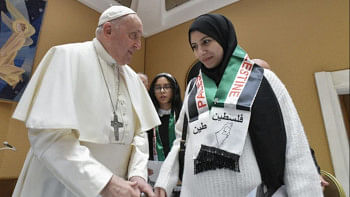Dhaka bourse recommends 10pc cash dividends
Dhaka Stock Exchange has recommended 10 percent cash dividends for fiscal 2014-15 that will bring relief to its shareholders who are passing tough times for a bearish trend in the secondary market, which is their main source of income.
The dividend proposal for fiscal 2014-15 will be placed at the premier bourse's 54th annual general meeting on March 31, which was initially scheduled for March 24.
This will be the first dividend payout for its shareholders since the demutualisation of the bourse, if the recommendation is approved at the AGM.
The bourse's accounts will be able to support a maximum of 14 percent in cash dividends for fiscal 2014-15, as its net income was Tk 134.64 crore with earnings-per share of Tk 0.75, compared to Tk 133.95 crore and Tk 0.74 respectively a year ago.
Most of the income was generated from interest on fixed deposits, rather than the bourse's core business, according to DSE's annual report.
The net asset value per share stood at Tk 11.68 at the end of June 2015, up from Tk 10.93 a year ago.
“By realising the dividend, we will be able to overcome the financial difficulties that we are facing due to the bearish trend in the secondary market,” said Rakibur Rahman, managing director of Midway Securities, a trading right entitlement certificate (TREC) holder, previously known as stockbroker.
The secondary market is yet to recover the losses incurred during the downswings in 2010-11. The DSEX, the benchmark index of the prime bourse, hovered around the 4,500-point level last fiscal year, with an average daily turnover of around Tk 500 crore.
On whether the dividend would reduce the bourse's financial strength, thus making it less attractive for the prospective strategic and institutional investors, Rahman said, “If the market is stabilised, trade volumes will increase and so will DSE's income. We hope for a vibrant capital market in the near future.”
As per the demutualisation scheme, 60 percent of the bourse's shares have been kept in a block account for the strategic and institutional investors. The rest 40 percent were allotted to existing shareholders.
After demutualisation, DSE's paid-up capital stood at Tk 180.38 crore at the end of June 2015.
The demutualisation scheme was approved by Bangladesh Securities and Exchange Commission in 2013, and the law on the issue was passed in 2012, to bring transparency to the stockmarket.
Demutualisation is a way to separate the bourses' management from ownership. It transforms a stock exchange into a profit-oriented company owned by shareholders and ensures alternative business models and operational efficiency.
Prior to demutualisation, Bangladesh's stock exchanges were non-profit cooperatives, owned by the exchange members, who were usually stockbrokers.

 For all latest news, follow The Daily Star's Google News channel.
For all latest news, follow The Daily Star's Google News channel. 



Comments